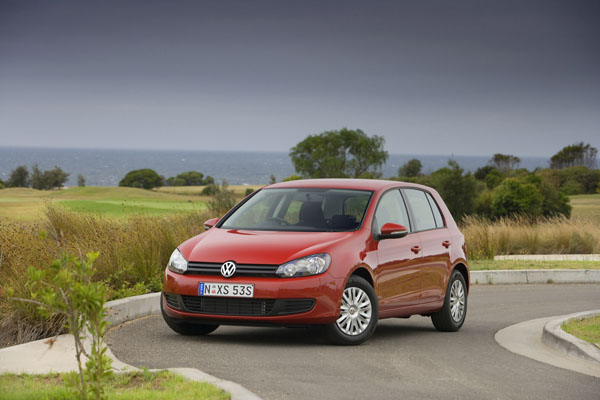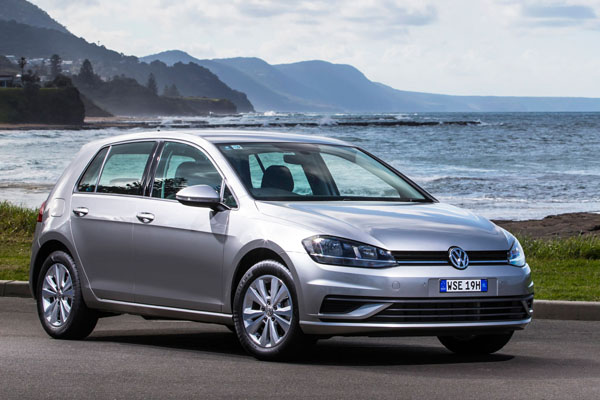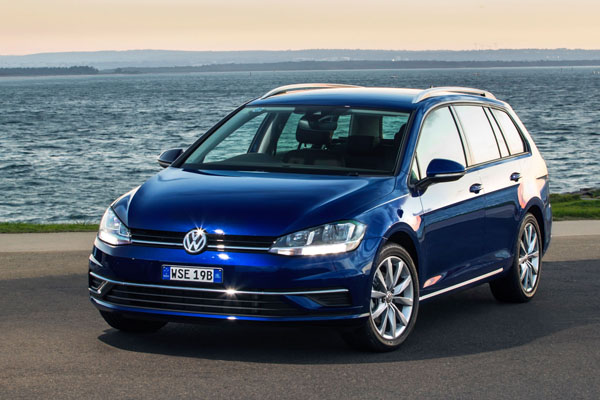

Often regarded as a benchmark car in its class if you’re a keen driver, the Volkswagen Golf has had its ups and downs in recent years. Both in troubles with quality control and false emissions testing. See the What To Look For section of this review for details about the latter.
The great majority of Golfs in Australia are five-door hatchbacks, there are also three-door hatches, five-door station wagons and a cabriolet. The ‘Golf’ four-door sedan is called Jetta.
Boot space in the sedans is substantially better than in the hatches and Jetta is certainly worth consideration.
Four-cylinder turbo-petrol engines are the most common, though there are plenty of turbo-diesel units in Australia these days.
Most transmissions in this country are dual-clutch automatics, with six ratios beside the diesel engines and seven when mated to the petrol.
The VW group was in the vanguard of this auto type (calling them DSGs). The early units were on the painful side at very slow speeds, later ones are better, but could still do with improvement.

Six-speed manuals are less popular than automatics Downunder, though we do prefer them and suggest you at least give one a try if you’re a keen driver.
Those who enjoy a really good drive should consider the VW Golf GTi. A fun machine for the keen driver, it’s showing signs of becoming a minor classic in the Australian hot-hatch market.
Then there’s the Golf R range of hotshots. These used to have a 3.2-litre V6 and are tagged Golf R32. The latest model, launched in 2011, takes a different tack, going for 2.0 litres four cylinders and a high-pressure turbo. This led to a name chance to simply Golf R – somehow it wouldn’t have been right to replace the R32 with an R20.
Golf is a relatively easy car to work on and spare parts are not overly expensive. The dealer network has expanded from the company’s low point in Australia during the mid-1990s and nowadays we seldom hear complaints about parts availability or servicing.

Insurance charges are about average for an imported European car in this class. The high-performance models may attract higher premiums, especially if the driver is young and/or inexperienced.
WHAT TO LOOK FOR
Some Golf diesel engines from 2008 to 2015 are the subject of a voluntary recall to modify them following the so-called ‘Dieselgate’ emissions scandal. If the work has been done a label will be attached inside the left front door frame.
Ensure that dual-clutch DSG transmissions are positive in their shifts and don’t hesitate too much at very low speeds.
DSG automatics in the Golf 6 had serious problems resulting in a voluntary recall by VW Australia. In some cases, the complete unit had to be replaced, in others they were repaired. Golf 7 units appear to be significantly better. Have a qualified mechanic drive the car if there’s the slightest doubt.
Make sure a manual gearbox doesn’t crunch on fast downchanges. This is more likely to have been caused by hard and/or bad driving technique than a defect in the box.
Check the engine oil for darkening, and make sure the sump is full to the correct mark. Low engine oil, and they do use more than they should at times, can cause a catastrophic failure.
Engines should start quickly. Listen for untoward engine noises, especially when it’s cold.
Look for smoke from the exhaust when the engine is driven hard, particularly on long uphill runs.
Check all electric components are working correctly and that no warning lights appear during your test drive.
Feel and look for uneven tyre wear, particularly on the front wheels. This may mean the wheel has been crashed into a kerb, or that the car has been thrashed.
HOW MUCH?
Budget on spending from $2000 to $5000 for a 2009 Volkswagen Golf 1.6; $5000 to $9000 for a 2010 GTD; $6000 to $10,000 for a 2009 GTi or a 2012 Comfortline; $8000 to $12,000 for a 2014 Comfortline; $10,000 to $15,000 for a 2013 GTi; $12,000 to $18,000 for a 2012 R or a 2015 GTi; $15,000 to $21,000 for a 2016 Highline; $17,000 to $24,000 for a 2018 Comfortline; $20,000 to $28,000 for a 2014 R; $23,000 to $31,000 for a 2019 Highline; and $34,000 to $45,000 for a 2020 R.
CAR BUYING TIP
Spend at least a month before buying a car to get a feeling for prices and special deals on the types of car you’re considering.
RECALLS: To browse recalls on all vehicles go to the ACCC at: www.productsafety.gov.au/products/transport/cars/









